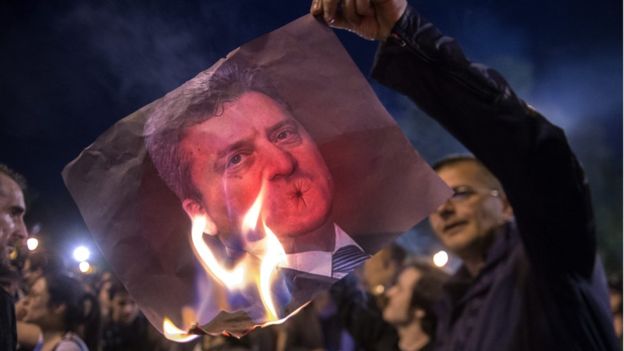

Photo credit(©) EPA
In his public address, the President highlighted that he has issued decisions to pardon a wide range of politicians, as is his prerogative under the law, saying that he “decided to use [his] constitutional right to help overcome the political crisis,” and to protect the judiciary from the pressure of the international community. He draws this prerogative under article 1-a of the Law of Pardons. A recent Constitutional Court Decision paved the way for the President’s actions, annulling the provision in the law that bars pardons to people convicted or suspected of election fraud, among other crimes.
While the law certainly gives the President the authority to issue pardons to individuals, it does not leave the procedure entirely at the President’s discretion. Articles 2 and 3 clearly state (pdf) that the pardon procedure can only be initiated by the Minister of Justice. There is no back door to this requirement. Given the fact that the there was a recent re-shuffle of the Ministers of Justice, the fact that the Minister is from the junior coalition member, DUI, and not the majority party (from which the President received his nomination), VMRO-DPMNE, and given the President’s claim that he did not consult any political party in reaching his decision, it is reasonable to conclude that the legal process mandated by the Law has been sidestepped. This brings into serious doubt the legality of the whole pardon process. However, a news portal has already reported that two individuals connected with the wiretapping investigations have been released from detention, most likely due to the consequences of the President’s decision.
Which brings us to our next topic. If the legality of the pardons stands, it will gut the reasons for the Special Prosecutor’s existence. The office was established as part of the Przino agreement, which brought the opposition back into Parliament and set a timeline and conditions for early elections. The Special Prosecutor was tasked with investigating the alleged crimes that the wiretaps alluded to. As a result, the Special Prosecutor’s office issued several indictments of high ranking members of the majority ruling party, VMRO-DPMNE. This has earned the staff of the Special Prosecutors office high praise, and even rock-star status among Macedonia’s populace. The President’s decision effectively kills all that.
While the Special Prosecutor’s office will still exist, and will still be able to investigate alleged crimes and issue indictments, the President has already committed himself to issuing pardons to all new suspects. The ones that are currently indicted have already been pardoned. However, the legal uncertainty surrounding the decision to issue pardons, the fact that the Minister of Justice will be under public scrutiny should he initiate any future pardons requests, and the fact that the Minister of Justice belongs to a different political party to the President may leave an open window for the Special Prosecutor to continue her work. If the Minister of Justice, as the gatekeeper of the pardon process, refuses to initiate any more pardon procedures (it is still in doubt whether he has initiated any at all) it will effectively put a stop to the President’s plan, which, despite his claims, seems to have been tightly coordinated with the leaders of the ruling VMRO-DPMNE.
With his latest actions the President has effectively put the last nail in the coffin of the rule of law in Macedonia. The hope that, by means of a thorough and transparent procedure, the Special Prosecutor could demonstrate that Macedonia is a country ruled by “law and not by men”, or is at least on the path towards becoming one, now lies in tatters. It dispels the idea that the Special Prosecutor’s team will be Macedonia’s Untouchables.
The consequences of the President’s attack on the rule of law have so far been to re-ignite the protests against the Government and the ruling party, VMRO-DPMNE. A coalition of NGOs and smaller political parties have already begun protesting the President’s actions, some carrying the slogan “no justice – no peace.” If the protests of 2015 are any indication, it is likely that they will only grow in size as time passes and public sentiment against the President’s action builds.
A major challenge for the protest movement will be its relations with the major opposition party, SDSM. On the one hand, the protest movement wants to keep its authenticity as a civil and civic movement that could, if and when the crisis is resolved, act as a corrective force to any future Government, whatever its political shape. They want to be able to stop history from repeating itself. On the other hand, without the involvement of the biggest opposition party, SDSM, it may not be able to achieve the required “mass”, in terms of numbers of supporters, to produce any results and become an adequate pressure in the political process. The experience of 2015 and the Przino agreement, where the protest movement did not get a seat at the table, will still be in the minds of many the protest’s organizers.
Whatever the outcome of the decision on the legality of the President’s pardons, one thing seems to be certain: he has re-set the clock back to 2015. It is hard to imagine that, even if the Special Prosecutor continues her investigative work and issues indictments in the future, the opposition parties will have the stomach to go back to the Przino agreement. It is even uncertain that it can trust any future negotiated settlement with the ruling VMRO-DPMNE, given the consistent bad faith it has shown during the process.